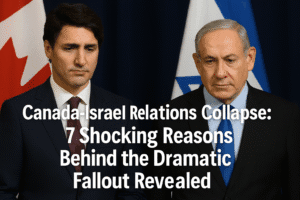Canada-Israel Relations Collapse: 7 Shocking Reasons Behind the Dramatic Fallout Revealed
Canada’s relationship with Israel, once a pillar of solidarity under Stephen Harper’s staunch pro-Israel stance, has fractured dramatically. A decade ago, Harper’s government aligned with Israel at the UN, voting against Palestinian-focused resolutions and fostering personal ties with Benjamin Netanyahu. Justin Trudeau initially maintained this support but began pivoting by 2019, backing Palestinian self-determination at the UN as domestic pressure grew over Israel’s West Bank policies. The 2022 inclusion of far-right settlers in Netanyahu’s coalition further strained ties, but Israel’s conduct in Gaza post-October 2023—marked by mass civilian casualties, attacks on aid convoys, and blockade-induced famine—sparked global condemnation.
Canada, alongside France and the UK, escalated criticism, threatening sanctions over Israel’s expanded military operations and aid restrictions. Diplomatic tensions peaked when IDF soldiers fired near Canadian diplomats in Jenin, prompting Prime Minister Mark Carney to label the act “unacceptable.” Netanyahu’s defiance, accusing Western leaders of emboldening Hamas, reflects his growing isolation. The breakdown underscores a clash between historical alliances and shifting moral imperatives, driven by evolving public sentiment, legal accountability demands, and Israel’s hardline policies—a stark redefinition of a once-unshakeable partnership.

Canada-Israel Relations Collapse: 7 Shocking Reasons Behind the Dramatic Fallout Revealed
Canada’s relationship with Israel, once a cornerstone of its Middle East policy, has unraveled dramatically over the past decade. What began as a bond of unwavering solidarity—epitomized by Stephen Harper’s declaration that Israel had “no greater friend” than Canada—has devolved into a diplomatic rift marked by sanctions threats, UN rebukes, and accusations of war crimes. This breakdown, accelerated by Israel’s conduct in Gaza, reveals deeper shifts in global politics, domestic priorities, and the moral dilemmas of modern warfare.
The Harper Era: Unconditional Support
Under Prime Minister Stephen Harper (2006–2015), Canada positioned itself as Israel’s staunchest ally. Harper’s government opposed nearly all UN resolutions critical of Israel, framing them as unfair targeting of a democratic state. His personal rapport with Benjamin Netanyahu, including a now-infamous piano duet in 2014, symbolized this alignment. Canada’s voting bloc at the UN—often alongside the U.S. and Pacific microstates—became a hallmark of Harper’s foreign policy, appealing to domestic conservative voters and pro-Israel advocacy groups.
Trudeau’s Gradual Shift: Cracks in the Foundation
Justin Trudeau initially maintained Harper’s pro-Israel stance, declaring in 2015 that Canada would remain a “strong, true friend.” However, subtle shifts emerged. By 2019, Canada voted in favor of a UN motion affirming Palestinian self-determination, a departure from its earlier positions. Critics accused Trudeau of bowing to progressive voices within his party, particularly as younger Canadians increasingly sympathized with Palestinian statehood.
The 2021 abstention on a vote to elevate Palestine’s UN observer status signaled growing discomfort with Israel’s expansionist policies. Yet Canada hesitated to take bold action, even as Netanyahu’s coalition government—reliant on far-right settlers like Bezalel Smotrich—normalized extremist rhetoric and violence in the West Bank.
Oct. 7 and the Gaza War: A Turning Point
Hamas’s October 2023 massacre initially unified Western allies in support of Israel. However, the IDF’s retaliatory campaign in Gaza—marked by mass civilian casualties, attacks on aid convoys, and the use of starvation as a tactic—tested this solidarity. Key moments deepened the rift:
- Attacks on Aid Workers: The killing of Canadian veteran Jacob Flickinger in an April 2024 airstrike on a World Central Kitchen convoy sparked outrage.
- Hospital Bombings: Repeated strikes on medical facilities, including the March 2025 Al-Awda Hospital attack, drew comparisons to past Israeli military controversies, such as the 1982 Sabra and Shatila massacres.
- Blockade of Aid: Israel’s restrictions on food and medicine into Gaza, described by UK Foreign Minister David Lammy as “abominable,” led to famine warnings and global condemnation.
The Breaking Point: Multilateral Pressure Mounts
In July 2024, Canada joined France and the UK in a historic joint statement demanding Israel halt its Gaza offensive, lift aid restrictions, and cease West Bank settlement expansion—or face sanctions. This marked a stark departure from decades of diplomatic caution. Prime Minister Mark Carney’s condemnation of IDF soldiers firing near Canadian diplomats in Jenin further strained ties, with Netanyahu accusing Western leaders of “emboldening Hamas.”
Why the Shift Matters: Domestic and Global Dynamics
- Changing Public Opinion: Younger Canadians, galvanized by social media coverage of Gaza’s humanitarian crisis, increasingly view Israel through a lens of post-colonial critique. This demographic shift pressures leaders to recalibrate policies.
- Legal and Moral Accountability: Canada’s restored funding to UNRWA (after initially freezing it over unsubstantiated Israeli claims) reflects waning trust in Israel’s narratives. Similarly, support for ICC investigations signals a prioritization of international law over bilateral loyalty.
- Netanyahu’s Isolationist Playbook: The Israeli PM’s reliance on far-right coalition partners alienates moderate allies. Smotrich’s calls to “cleanse” Gaza and annex the West Bank have made cooperation politically toxic for Western leaders.
The Road Ahead: A New Diplomatic Reality
Canada’s hardening stance mirrors broader European disillusionment. With the U.K. suspending trade talks and France advocating for Palestinian statehood, Netanyahu’s Israel risks becoming a pariah among democracies. Yet Ottawa faces challenges:
- Balancing Principles and Politics: Sanctions could satisfy progressive voters but strain ties with the U.S. and pro-Israel lobbies.
- Navigating Multilateralism: Coordination with the UK and France offers strength but requires consensus, complicating swift action.
- The Trump Factor: A potential U.S. return to unconditional support for Israel under Trump may isolate Canada further.
Conclusion: A Relationship Redefined
Canada’s journey from Israel’s “best friend” to a vocal critic underscores the tension between historical alliances and evolving ethical imperatives. As Carney’s government navigates this new terrain, the crisis reflects a wider reckoning: how democracies balance solidarity with accountability in an era of asymmetric warfare and instant global scrutiny. For Israel, the loss of traditional allies like Canada may prove as consequential as any military defeat—a stark reminder that even friendships forged in fire have their limits.
You must be logged in to post a comment.